May brings a bunch of classic and not-so-classic 4K-UHD releases to Home Entertainment.
The Three Musketeers (The Queen’s Diamonds) / The Four Musketeers (The Revenge of Milady) — 4K-UHD/Blu-ray — Criterion
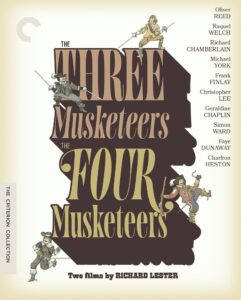
There have been dozens of film adaptations of Alexandre Dumas’s famous adventure tale, The Three Musketeers, published in 1844. The most notable include the 1921 Douglas Fairbanks silent film, a 1939 musical starring Don Ameche and the 1948 Gene Kelly version. Even Disney took a crack at it in 1993 with Charlie Sheen and Keifer Sutherland. And the Russians produced a gender-swapped musical version in 2004. Most recently, Martin Bourboulon helmed a 2-pic French re-envisioning of the epic saga starring François Civil. Both were extraordinary.
Still one can argue that the most gloriously comedic, smashingly swashbuckleresque adaptation is Richard Lester’s star-studded two-parter, originally conceived as one three-hour film with an intermission, The Three Musketeers (The Queen’s Diamonds) and The Four Musketeers (The Revenge of Milady), released in the U.S. in March of 1974 and February of 1975, respectively.
George MacDonald Fraser, who had written scripts before but never had one produced, wrote the clever, silly, and subtly political screenplay for both movies and Michel Legrand scored the first while Lalo Schifrin scored part deux.
The first installment is heaving on the slapstick, action-adventure side while the follow-up gets deliciously darker with a couple of major characters murdered. And inasmuch as they were presented as two separate movies, one does not work without the other.
Strapping Michael York, fresh off of playing bisexual Cliff opposite Liza Minnelli’s Sally Bowles, in Bob Fosse’s Cabaret embodies d’Artagnan with great aplomb. He’s simultaneously arrogant and naive.
The initial trio are perfectly cast with the dashing Oliver Reed leading the bunch as Athos. Richard Chamberlain is quite funny as Aramis and Frank Finlay, the bumbling fool, Porthos.
The two main female characters are played by Faye Dunaway, who has far more to do in The Four Musketeers. She is perfectly devious and dastardly. While Raquel Welch, in a Golden-Globe-winning turn, shows off her great comic chops and slapstick talents, especially in The Three Musketeers. Dunaway was at the height of her career with Chinatown and The Towering Inferno, both bowing in 1974 and Network on the horizon. For Welch, this would prove to a cinematic high point.
Charlton Heston, in an odd bit of casting as Cardinal Richelieu, and Christopher Lee as Count de Rochefort, lend gravitas to the pic.
Much like the StudioCanal 4K, Criterion has done an outstanding job with the visuals and sound. Absolutely no complaints. David Watkin’s splendid cinematography is showcased magnificently.
The Blu-ray Special Features tend to go over the same territory but for fans are a must-watch beginning with the 2002 two-part Saga of the Musketeers and a brand new 4-part doc by critic David Cairns. Both do a fantastic job of taking us through the making of the epics and delve into what Lee calls the “modern skulduggery” involved in how one three-hour epic ended up being two longer, richer movies. And just how certain cast members lawyered-up forcing producer Ilya Salkind (along with his father Alexander) to cough up more money for the 13 principal actors. This led to the Salkind Clause which guaranteed that actors knew up front how many films they were making and being paid for.
The disc also includes The Making of The Three Musketeers, a 1973 featurette with behind-the-scenes footage of Lester, who would later step in and take over Superman IIwhen the Salkinds decided to replace Richard Donner.
I haven’t seen all of the many cinematic versions of Dumas’ adventure tale, but I felt like a little boy again watching these gems.
The Umbrellas Of Cherbourg – 4K-UHD/Blu-ray — Criterion
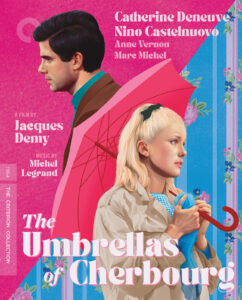
Filmmaker Jacques Demy splashed at the height of the French New Wave although his work didn’t necessarily fit into the same form as his colleagues who rejected traditional conventions. Demy worked within those conventions to, often, create something both old-fashioned and new, much like his most celebrated film, The Umbrellas of Cherbourg, now being given the fabulous Criterion treatment via a new 4K digital restoration, undertaken by Ciné-Tamaris and approved by Mathieu Demy, director Demy’s son, with 5.0 surround DTS-HD Master Audio soundtrack.
From the gorgeous camera work (Jean Rabier) to the sweeping score (Michel Legrand) to the lush production design (Bernard Evein) to the richly multicolored costumes (Jacquline Moreau), Umbrellas pops magnificently on this 4K disc and the sound is a crisp and clear delight.
With this 1964 gem, Demy set out to break ground by having all the dialogue in the film sung—quite a daunting task but one that he and his composer Legrand were able to miraculously complete—to near perfection.
The story is broken up into three segments.
Part One: The Departure
Part Two: The Absence
Part Three: The Return
The basic plot sees Madame Émery (Anne Vernon) and her 17-year-old daughter Geneviève (Catherine Deneuve) running a small umbrella boutique in the coastal town of Cherbourg, Normandy. Geneviève is in love with a cute, young auto mechanic, Guy (Nino Castelnuovo). Mama does not approve. When Guy is drafted and sent off to fight in the Algerian War, Geneviève is left alone…and pregnant. Left alone, she is wooed by a kind Parisian jeweler (Roland Cassard) who offers to marry her and raise the child as his own. Geneviève must make an impossible decision.
The Umbrellas of Cherbourg catapulted the young Deneuve to international stardom. The Oscar-nominated (Indochine in 1992) actress has had an astonishing career and watching this film you can see why audiences were so taken with her as Geneviève.
Castelnuovo started as a mime and went on to play a small role in Luchino Visconti’s Rocco and His Brother (1960) before Umbrellas. Afterwards, he continued to work, including a cameo in Anthony Minghella’s Oscar-sweeping, The English Patient in 1996, but did not achieve anywhere near the same level of fame as Deneuve. His performance in the film, while understated, was quite powerful.
The film won the Palm d’Or at the Cannes Film Festival and was nominated for the Academy Award for Best Foreign Language Film in 1964 and then nominated for four more Oscars in 1965 (thanks to a rule that no longer exists) including Best Screenplay Written Directly for the Screen, Best Original Score, Best Scoring—Adaptation or Treatment and Best Song, the haunting and evocative, “I Will Wait for You.”
I adore this film but I’m of two minds about the ending. The lovers only get a brief final scene together. On the one hand, I understand what Demy was going for–they have nothing to say to one another or simply can’t bring themselves to really talk. But I also feel they should have been given more time to ask some nagging questions. At the very least, the audience deserves to hear them out after investing so much in the relationship. But perhaps I’m not being fair to the characters and simply being selfish. I’ll have to watch it again.
The Special Features include a revealing 2008 doc, Once Upon a Time . . . “The Umbrellas of Cherbourg,” a French TV chat with Demy and Legrand where the journo asks some really invasive questions, an interview with film scholar Rodney Hill, incisive archival audio interviews with Legrand and Deneuve at the National Film Theatre in London and a demonstration of the 2013 restoration.
I was also gobsmacked to learn from the 2008 doc that none of the actors did their own singing but were dubbed by real vocalists –working closely with them.
Demy went on to make 10 more features before dying of HIV/AIDS complications (he was bisexual, married to filmmaker Agnes Varda), including The Young Girls of Rochefort. But his masterpiece is The Umbrellas of Cherbourg.
https://www.criterion.com/films/27933-the-umbrellas-of-cherbourg
Prophecy – 4K-UHD – Kino Lorber
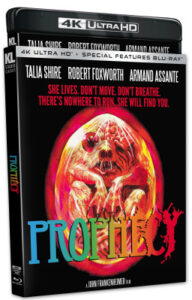
John Frankenheimer’s 1979 monster-mess, Prophecy, not to be confused with The Prophecy starring Christopher Walken, is another odd 4K-UHD release where you have to wonder why so many truly classic films made in 1979 are still awaiting the 4K treatment. I’m talking about All That Jazz, The China Syndrome, Manhattan, The Rose, Norma Rae, Being There, Hair, to name just a few. I know many of these titles are tied up in studio ownership, but Criterion, Kino Lorber, Arrow, Shout!, Vinegar Syndrome—help us out. That said, this was worth the 4K-UHD presentation, if only for Harry Stradling, Jr.’s mesmerizing cinematography.
In addition, I am always saying to fellow cinephiles that the worst films of the 60s and 70s are far more interesting to watch than the best in most other decades. And I stand by that, even of certain movies insist on testing my theory.
This was my first time seeing Prophecy, which opened in June of 1979 to tepid reviews and okay box office. And I didn’t hate it. The terrific brand new HDR/Dolby Vision Master transfer (from a 4K Scan of the 35mm Original Camera Negative) made for an engrossing, if perplexing watch. The film’s heart is in the right place and feels timelier than ever when it comes to its message about paying the price for decimating the environment. But much of the first half is dull and once we get to see the monster (and if you used that word onset, Frankenheimer would fine you), it looks like a bloodied, mutated bear, more laughable than scary.
The simple plot has Dr. Robert and Maggie Verne (Robert Foxworth and Talia Shire) traveling to Maine to research the activities of a lumber mill and how it may be polluting the environment and causing the mutation of certain species into, well, monstrosities of nature. One, in particular, is killing people. The Native Americans, known as Opies (original people), blame a vengeful spirit known as Katahdin.
Shire, coming off two Oscar nominations (The Godfather Part II and Rocky), may have been too anxious to headline a movie since the three that followed, Old Boyfriends, Prophecy and Windows were not the best showcases for her talent. In Prophecy her performance is muted.
Armande Assante and Richard A. Dysart are compelling in supporting roles.
Frankenheimer had a fascinating, topsy-turvy career. He started in television and often returned, winning four Emmy Awards. And, although he was nominated for three DGA Awards (Birdman of Alcatraz, The Manchurian Candidate, Grand Prix), he was never Oscar-nominated—a gross oversight on the Academy’s part. His other notable films include Seven Days in May, The Fixer, The Iceman Cometh, French Connection II, Black Sunday and his lunatic 1996 remake of The Island of Dr. Moreau, starring Marlon Brando—probably the film closest to Prophecy, in terms of themes as well as its legion of WTF moments.
According to screenwriter David Seltzer (The Omen), his initial concept for the creature was much more terrifying and in a recent interview on the Blu-ray, he blames Frankenheimer for insisting that it be bear-like.
The 4K-UHD looks and sounds terrific. Special features include a new audio commentary by authors Bryan Reesman and Max Evry as well as significant (fairly new) chats with Shire, Foxworth, Seltzer (who enjoys taking pot shots at Frankenheimer), make-up effects designer Tom Burman, make-up effects artist Allan Apone and mime artist Tom McLoughlin, who was one of a few actors who played the creature.
Prophecy is not Frankenheimer’s best or even campiest film, but it’s worth watching, especially if you’re a supernatural horror aficionado.
https://kinolorber.com/product/prophecy-4kuhd
The Andromeda Strain — 4K-UHD — Arrow
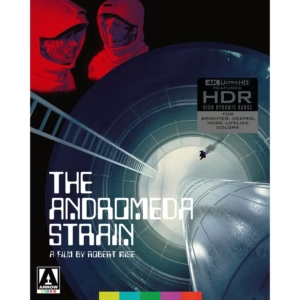
Seven-time Academy-Award-nominee and four-time winner, Robert Wise came to prominence when he was tasked with editing Citizen Kane for Orson Welles in 1941. Shortly thereafter he was directing his own films which included, Body Snatcher (1945), The Day the Earth Stood Still (1951), Somebody Up There Likes Me (1956), I Want to Live! (1958), followed by the Oscar-winning West Side Story (1961) and The Sound of Music (1965). He would also make the acclaimed film, The Sand Pebbles (1966) and the flop Star! (1968) before returning to the director’s chair with the 1971 adaptation (by Nelson Gidding) of the Michael Crichton thriller, The Andromeda Strain.
The plot sees a government satellite crash into a small New Mexican town where, soon thereafter, everyone in that town dies, except for an infant and an elderly man. They’re immediately sent to “Wildfire,” a covert underground lab, to be studied. It’s discovered that the satellite brought to Earth a deadly organism from another word and a group of intrepid scientists must figure out what this extraterrestrial virus is and how to destroy it before it decimates humanity. Sounds exciting, right? It certainly should’ve been, and yet…
Prior to The Andromeda Strain, most sci-fi virus-outbreak pics were low-budget B-movies, but Wise and Universal produced a slick, big-budget pic. Yet, the decision was made to not cast any major names. And, honestly, an all-star cast would have helped immensely with the convoluted plot (as well as a better, less muddled script). This could have been another epic ‘70s disaster film. Still, Wise does his best to keep us intrigued by keeping a docu-thriller pace. He also took advantage of split screen way before it was vogue and used advanced computerized photographic visual effects that Douglas Trumbull had pioneered with 2001: A Space Odyssey.
The Andromeda Strain was nominated for two Oscars, Best Art Direction and Best Film Editing.
The folks at Arrow has done an exceptional job with the 4K restoration from the original camera negative. The film’s images are stunning, and the audio is clear.
Arrow released the film on Blu-ray, in 2019, and all the special features are the same and include an audio commentary by critic Bryan Reesman, an appreciation by critic Kim Newman, an archival interview with Crichton as well as The Andromeda Strain: Making the Film, a 2001 featurette that include chats with Wise and Gidding. The latter is chock full of interesting details.
The film has its suspenseful moments but is often too procedural when it should be nail-biting. Still, if you’ve never seen it, it’s worth a look.
https://www.arrowvideo.com/4k/the-andromeda-strain-limited-edition-4k-uhd/16247824.html
Jason X — 4K Ultra HD/Blu-ray Limited Edition — Arrow
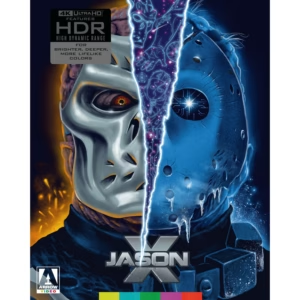
Full disclosure, I’ve never been a fan of slasher films or the Friday the 13th franchise. And I think Halloween is a crappy movie. I have no idea why it’s considered iconic. Fans, you can all throw shade my way now.
That said, about a decade or so ago, my husband and I decided to watch all Friday the 13th films in order (on DVD)—I had not seen any since Part 3. I was still not impressed until we got to Jason Takes Manhattan (Part 7), which I actually enjoyed. Of course, it’s one of the most fan-hated in the series. What surprised me most, in this craptacular marathon, was how much I appreciated Jason X. I found it to be clever and inventive, despite outright stealing from the Alien franchise. Of course, fans dislike this one, too.
Revisiting Jason X on Arrow’s Limited Edition 4K Ultra HD Blu-ray, it’s just a lot of fun. It’s not really scary as much as it’s full of neat kills and amusing, tongue-in-cheek scenes. And the cast doesn’t suck, a rarity in this particular franchise.
The plot tosses Jason Voorhees (Kane Hodder) into space in the year 2455, where the human race has fled the horrifically polluted Earth for a new planet, Earth II (how original). A scientific crew discover Jason’s cryogenically frozen body (which makes no sense when you know just how the 9th film ends) and they, of course, bring him back to their spaceship. You can guess the plot from there, suffice to say, he awakens and does what he is expected to do…sporting a new look.
There’s even a brief cameo by director David Cronenberg!
Arrow’s 4K (2160p) Ultra HD Blu-ray presentation in Dolby Vision looks fantastic. And the DTS-HD 5.1 surround audio is top-notch.
The disc boasts a slew of special features including a brand-new audio commentary with film historians Michael Felsher and Steve “Uncle Creepy” Barton as well as two archival commentaries, including one with director Jim Isaacs and one with writer Todd Farmer.
Treats also include a new interview with composer Harry Manfredini, archival interviews with Farmer and actor Kristi Angus, archival docs on the making of Jason X and the history of the character. There are also cast and crew chats, behind-the-scenes footage and an electronic press kit.
The best of the goodies is the archival doc, Outta Space: The Making of Jason X, featuring interviews with producers Noel Cunningham and Sean S. Cunningham, Hodder and Farmer—where the creatives admit that they directly stole from Alien and Aliens.
It’s a shame that an interesting reinvention of the saga did not sit well with fans, because, for this non-fan, it’s the best of the series.
https://www.arrowvideo.com/4k/jason-x-limited-edition-4k-uhd/16247823.html
Jason Goes To Hell — 4K Ultra HD/Blu-ray Limited Edition — Arrow
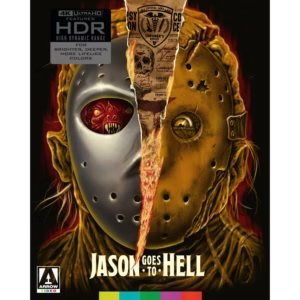
And that brings me to the film made right before Jason X, Jason Goes to Hell. The Arrow Limited Edition boasts two cuts of the film, the original theatrical release and the unrated cut, basically with a few more minutes of nasty slasher gore added.
Jason Goes to Hell is just…not very good. Sure, Arrow has done a great job with both cuts–pristine 4K (2160p) Ultra HD Blu-ray presentations in Dolby Vision (HDR10 compatible). Sound quality: fab. But the movie itself is barely fun to watch, unless you like innocuous narratives and senseless violence.
The initial title of the film was Jason Goes to Hell: The Final Friday, which is a misnomer in every way. It wasn’t the last film, and he did not go to hell—that’s a film I would have loved to have seen. Imagine, Jason meeting up with all the characters in Dante’s Inferno? Okay, too lofty? How about Jason coming up against, Hitler, Stalin and Joan River? Who’d survive? Or watch Jason take on predator Catholic priests! I’d pay to see him decimate those degenerates. But I digress…
Instead, after he’s blown to kingdom come (one of the only decent sequences in the film), Jason’s torn-to-smithereens body is taken to the morgue, but his heart is still beating and his soul hops into the body of the coroner (because he has a soul?) where he continues to kill, and his soul continues to hop—trying to get to his last living relatives so he can—I know, I’ll stop here. Suffice to say, it’s just dumb. You barely see Jason at all. The final sequence is actually where the film should have begun.
But if you’re a fan of this sometimes-campy fiasco, you will definitely enjoy the fact that you can choose which cut to watch and dive into the host of special features including, brand-new interviews with special makeup effects creator Robert Kurtzman, actor Julie Michaels, composer Harry Manfredini as well as archival chats with director Adam Marcus and actor Kane Hodder. There’s also some TV footage and a host of commentaries.
But don’t say I didn’t warn you!
https://www.arrowvideo.com/4k/jason-goes-to-hell-limited-edition-4k-uhd/16247822.html






![Emmys 2025: ‘Your Friends & Neighbors’ Olivia Munn On Her Best Role Since ‘The Newsroom’ [VIDEO]](https://thecontending.com/wp-content/uploads/2025/05/Oliviabest-120x86.jpg)

![Emmys 2025: Lena Hall on Ali’s Surprising Relatability In ‘Your Friends & Neighbors’ [VIDEO]](https://thecontending.com/wp-content/uploads/2025/05/lenabest-120x86.jpg)
